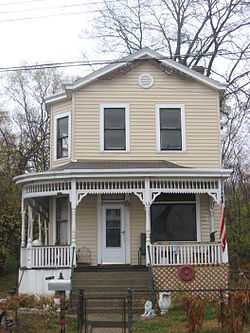LuNeack House
|
LuNeack House | |
 | |
|
Front of the house | |
 | |
| Location | 3718 Mead Ave., Cincinnati, Ohio |
|---|---|
| Coordinates | 39°6′45″N 84°26′18″W / 39.11250°N 84.43833°WCoordinates: 39°6′45″N 84°26′18″W / 39.11250°N 84.43833°W |
| Area | Less than 1 acre (0.40 ha) |
| Built | 1894 |
| Architectural style | Victorian |
| Governing body | Private |
| MPS | Columbia-Tusculum MRA |
| NRHP Reference # | 79002705[1] |
| Added to NRHP | August 24, 1979 |
The LuNeack House is a historic residence in the Columbia-Tusculum neighborhood of Cincinnati, Ohio, United States. Built in 1894,[1] it is a frame building with clapboard walls, two-and-a-half stories tall. The overall floor plan of the house is that of a rectangle, with the front and rear being the shorter sides, although the original shape has been modified by the extension of the rear and a hexagonal bay on the western side.[2]
Architecturally, the most distinctive portion of the LuNeack House is the large porch, which is attached to the southward-facing front of the house. Many ornamental elements compose its walls and railings, such as spindles and a balustrade; moreover, the porch-facing windows feature prominent lintels. Additionally, the gables that rise to the roof are the locations of other details, such as imbricated shingles, circular windows, and elaborately carven bargeboards.[2]
Taken together, the various components of the LuNeack House form a well preserved example of the Victorian style of architecture. Because the house has seen so few modifications since its original construction, it is architecturally distinctive; in 1978, a historic preservation survey of Columbia-Tusculum called it "outstanding" among the area's wooden Victorian residences.[3] One year later, the house was listed on the National Register of Historic Places due to its historically significant architecture. It was one of seventeen Columbia-Tusculum properties included in a multiple property submission related to the previous year's historic preservation survey; most of the properties were buildings, but the Columbia Baptist and Fulton-Presbyterian Cemeteries were also included.[1]
References
- ↑ 1.0 1.1 1.2 "National Register Information System". National Register of Historic Places. National Park Service. 2009-03-13.
- ↑ 2.0 2.1 Owen, Lorrie K., ed. Dictionary of Ohio Historic Places. Vol. 1. St. Clair Shores: Somerset, 1999, 624.
- ↑ Columbia-Tusculum Historical Society–Miami Purchase Association. National Register of Historic Places Inventory/Nomination: Columbia-Tusculum Multiple Resource Area. National Park Service, 1978-10-27, 13.
| ||||||||||||||||||||||||||
